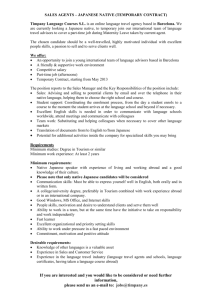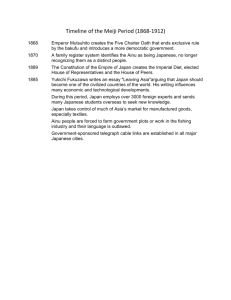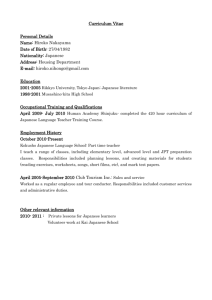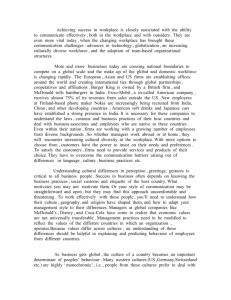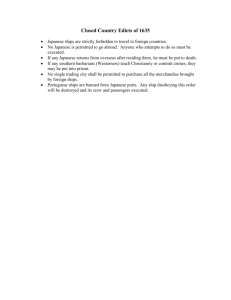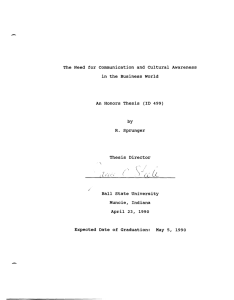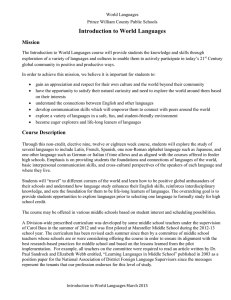Culture and identity
advertisement
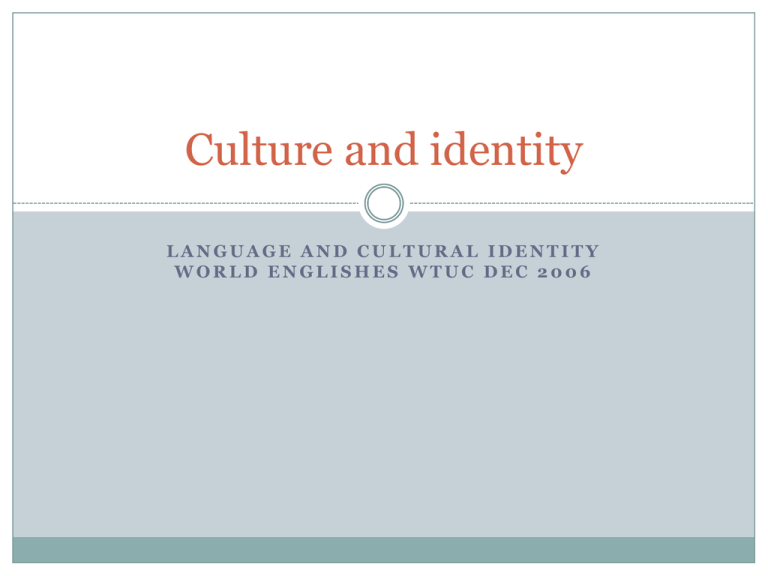
Culture and identity LANGUAGE AND CULTURAL IDENTITY WORLD ENGLISHES WTUC DEC 2006 Understanding others makes possible a better knowledge of oneself: any form of identity is complex, for individuals are defined in relation to other people - both individually and collectively and the various groups to which they owe allegiance, in a constantly shifting pattern. Understanding and valuing cultural diversity are the keys to countering racism. All individuals must feel free to explore the uniqueness of their culture and identity while developing understandings of the cultural diversity that exists in the world around them. Denying cultural expression means limiting the expression of unique perspectives on life and the transmission of knowledge from generation to generation. Culture refers to the customs, practices, languages, values and world views that define social groups such as those based on nationality, ethnicity, region or common interests. Cultural identity is important for people’s sense of self and how they relate to others. A strong cultural identity can contribute to people’s overall wellbeing. Cultural identity based on ethnicity is not necessarily exclusive. They may also identify with more than one culture. Culture is a defining feature of a person & a person’s identity, contributing to how they see themselves and the groups with which they identify. Culture may be broadly defined as the sum total of ways of living built up by a group of human beings, which is transmitted from one generation to another. Every community, cultural group or ethnic group has its own values, beliefs and ways of living. Language is intrinsic to the expression of culture. As a means of communicating values, beliefs and customs, it has an important social function and fosters feelings of group identity and solidarity. It is the means by which culture and its traditions and shared values may be conveyed and preserved. Language is fundamental to cultural identity. For this reason, it is important that people keep their own language alive. As languages disappear, cultures die. The world becomes inherently a less interesting place, but we also sacrifice raw knowledge and the intellectual achievements of millennia. An individual & a person’s sense of identity is grounded in their cultural identity . “I have... come to the conclusion that my identity does not have to be static. Sometimes, I feel Spanish and I like to identify with the Spanish culture while at other times I choose to reinforce my German, Irish-Anglo background”. “In many ways the two identities have become interwoven. A part of me is expressed through speaking Spanish and singing Spanish songs which is not expressed through speaking English or playing classical music... each language I speak and each music tradition I engage in carries with it a different world of meanings”. Cultural identity may be clearer to some people than it may be to others . Although many Americans, for example, identify with their Irish, West African, Chinese, or Mexican roots (among many others), they may still know themselves to be American. Once we have moved away from the place of our original culture and begun the process of adapting to another culture, we broaden our perceptions , noticing things that are done differently or similarly between the two cultures. We learn a whole new set of culturally and linguistically defined rules and value systems with the result that our own perception of the culturally induced life experience is expanded. “… I have found that once people have started to adapt to a second culture, they are able to adapt more quickly to a third culture and begin to feel more part of a multicultural construct than citizens of only one culture” . Exceptions to this rule have been found in people who have not yet returned to live in the original country; the country that they still feel a complete citizen of. If they do go back and stay long enough, they might notice that they are no longer the same person culturally as they were when they left originally and they also might notice that people are seeing them as being influenced by the other culture in some way. These returnees can sometimes feel like outsiders in the country that all along, they may have felt was home. “Who cares if it was unfortunate or not, but I have grown up with more than two cultures in my life history. When I was abroad, I thought of myself as representing the Japanese. Everyone told me that I was a Japanese, and without doubt, I was one. When I came back to Japan, though, I was a stranger”. “I had to be a Japanese, but the Japanese around me seemed to have thought of me as a foreigner. Somehow, what I did and thought seemed to have been different from others. In class, when the teacher was accusing us of some mischief that the class had done, I was the only one to meet the gaze of the teacher; everybody else were looking down at the desk and quiet, but I was arguing with the teacher. Sometimes, I couldn’t help but notice that I was the only one in class with a raised hand. In English classes there was always a strange uproar when I was assigned to read the textbook. I didn’t make much of these incidents, but it seems I was the queer fish among them. The Japanese would not look at me as an ordinary Japanese”. “As I kept on living in Japan, I noticed that I was criticizing the ways of Japan, its people, and its society: the infamous entrance examination system, group orientedness, conformism, etc. I never got used to doing things & “everybody all together” , nobody standing out, and in harmony ”. Sometimes it seemed easier to get along with foreigners. But I’m not a foreigner, am I?”. “Then, what am I? When I started to work, and had chances to visit other countries, there were always times when I would not want to go back to Japan. But when I remembered the faces of the friends that I got to know while living in Japan, I would think that however hard it is to work and live there, I would go back”. Then came the day when I noticed that the question “what am I?”I had somehow turned into the question “who am I?” No longer did I need to think in terms of nationality, or being a Japanese or a foreigner, or whatever. All I had to question was how am I going to live? what am I going to do and with whom? where am I going to have a place to live? for what am I going to be living? I am here, alive. That was the answer. Day after day, I meet people. I work. I have fun. I rest. I am well. No doubt, I have a plural number of cultural heritages in my background. It still seems that my thoughts and actions are not exactly like “ordinary Japanese”. But so what, I am myself. I came to want to get together with those people who have multiple cultures within themselves. Both in Japan and abroad, there are people with plurality: Those foreigners who have grown up in Japan. Those who went on studies abroad. Those whose father and mother have different heritages. Not even across national borders. If you think of cultures as not relevant to nationalities, there are huge differences even within Japan: Tokyo and Osaka. Rural and metropolitan. Even within Tokyo: Uptown and downtown. Broadway and offBroadway. Cultural differences can be found anywhere: Between men and women. Even you and I have cultural differences in between. Anytime when one meets another, the two will live in a cultural diversity. Everybody is a singular culture by him/herself. Therefore, I want to be myself. I want you to be yourself. An expert in being oneself, that’s what I want to be.

